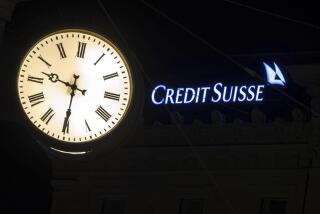‘Real Wave of Takeovers’ : Swiss Companies Start a Global Buying Spree
- Share via
ZURICH — Switzerland’s major companies, awash with cash after years of steady profits, are taking advantage of low interest rates and the strength of their national currency to buy companies all over the world.
“There has been a real wave of takeovers. We have never seen anything like it,” said Hans Kaufmann, who follows Swiss equities for Bank Julius Baer.
Chocolate and coffee producer Jacobs Suchard, which last year bought U.S. confectioner E.J. Brach from American Home Corporation Products and two West German companies, this year took over chocolate companies in Belgium and Italy and said it would take a stake in commodity group E. D. and F. Man.
Quality control firm Inspectorate International has been on a virtual spending spree in the past year, taking over three British companies and one--security and fire alarm systems maker Network Security Corp.--in the United States.
Kaufmann and other analysts say the Swiss industry’s international shopping expedition is far from over, and the country with the likeliest targets is the United States.
“I am convinced that Swiss industrial companies, especially the multinationals, will increase their direct involvement in the United States,” said Gilbert Puder, head of Swiss institutional research at private bank Sarasin und Cie.
Most recently, elevator and escalator manufacturer Schindler Holding AG said it was planning to spend around $662 million on an unspecified major acquisition, probably an American firm.
Such a move would dramatically increase the size of the company, which last year reported sales of $1.23 billion.
But it is modest compared with food conglomerate Nestle’s $3-billion purchase of U.S. dairy foods producer Carnation Co. in January 1985, which remains the largest merger in Swiss corporate history.
The spate of acquisitions is due largely to the exceptionally high level of Swiss corporate liquidity, the result of years of mounting profits that followed a wide-ranging restructuring of Swiss industry in the 1970s, analyst Kaufmann said.
“Swiss companies were forced to rationalize their production methods after the 1974 oil shock and they managed very quickly to boost profits and build up reserves,” he said.
Nestle, for example, had $3.72 billion in cash at the end of last year, representing 15% of its annual sales.
Chemical conglomerates Ciba-Geigy, Hoffmann-La Roche and Sandoz, which already have a substantial presence in the United States, and engineering concern BBC Brown Boveri also reported massive cash holdings.
Sarasin’s Puder says the dollar’s sharp fall has made U.S. acquisitions more attractive for Swiss companies, while growing protectionism in the United States is an added incentive.
“It is becoming more difficult for Swiss companies to export to the United States so they need to establish a presence there for strategic reasons,” he said. “Also, production costs in the United States have fallen compared with Switzerland.”
Hoffmann-La Roche said last month it was studying potential acquisitions in such areas as over-the-counter drugs, adding that the weak dollar had made the U.S. companies more interesting.
But Joerg Graf, head of institutional investment for bankers J. Vontobel und Co., said he believes longer-term strategic considerations--the need to grow and to protect market share--are the major factors behind most of the acquisitions.
“I don’t think anyone buys U.S. companies just because the dollar is cheap,” Graf said.
Nestle’s chief executive, Helmut Maucher, said in April that the company would pay a high price only for companies with exceptional growth potential.
“We would not rule out big acquisitions, but most of these have simply become too expensive,” he said. Analysts, however, have said Nestle is well-placed to make a fresh acquisition.
More to Read
Inside the business of entertainment
The Wide Shot brings you news, analysis and insights on everything from streaming wars to production — and what it all means for the future.
You may occasionally receive promotional content from the Los Angeles Times.










